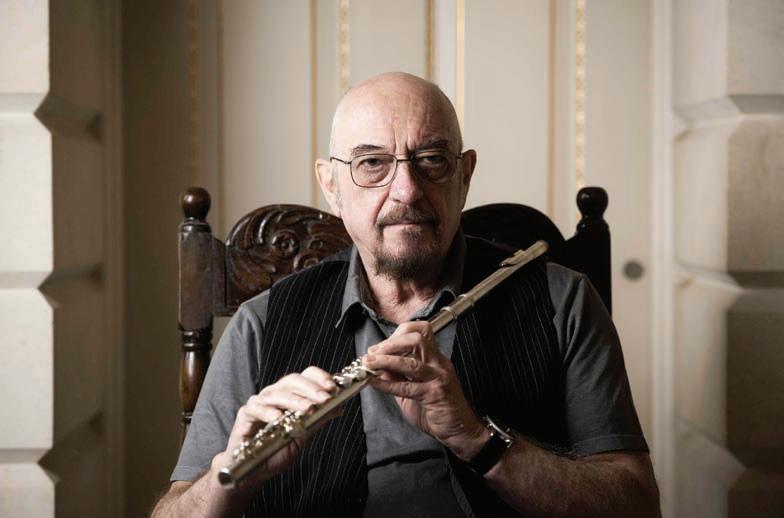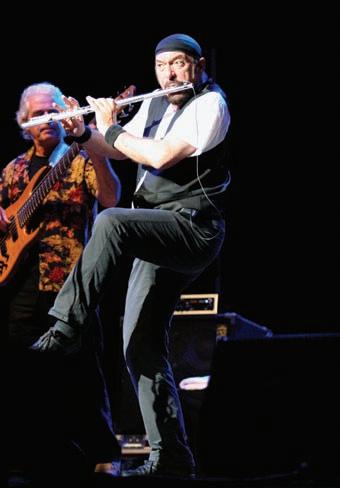
4 minute read
JETHRO TULL
Jethro Tull at the Abbey
Richard Wyatt talks to Ian Anderson of Jethro Tull –who is performing at Bath Abbey in December –about performing in churches, why he likes to give back, and if, at the age of 75, he is still managing to play the flute on one leg
Advertisement
On 12 December Bath Abbey will resonate with the music of Jethro Tull, the long-time progressive rock band fronted by multiinstrumentalist Ian Anderson. Formed in 1968, the band first focused on blues rock and jazz fusion, but later introduced English folk, hard rock, and classical music to create its own progressive rock sound. The band has sold an estimated 60-million albums worldwide, and loyalty remains strong, with tickets almost sold out.
One person who will be there is local journalist and long-time fan Richard Wyatt, who spoke to Ian Anderson recently about the upcoming performance. Richard was happy to share some excerpts from the interview with us.
How do you feel about performing in a religious space like Bath Abbey?
“The first time I performed in a church was for a multi-artist performance 20-25 years ago. The first time I performed in a church as a fundraiser was at the invitation of Greg Lake, the base player and singer of Emerson Lake and Palmer, who was performing songs at St Bride’s Church in Fleet Street, London.
“I do it because it is raising money for historic buildings. They have no support from the government – they depend entirely on public donation or, in the case of big cathedrals, an entrance fee. So it’s a question of keeping the roof on.”
How much of the concert proceeds go to Bath Abbey?
“I pay the guys in the band, I pay for the crew, the sound, the lights, the hotels and the transport, which you can imagine costs quite
Ian Anderson with his flute. Also appearing with Jethro Tull are Joe ParrishJames (guitar and vocals), Scott Hammond (drums), John O’Hara (keyboards and vocals) and David Goodier (bass guitar and vocals) a few thousand pounds for a performance, but I fund all this so that 100% of the ticket money stays with the Abbey. It’s simpler, it’s more clear-cut and out of the profits that I hope to make from my other concerts during any calendar year, I can afford to give a little back –this is one of the charities that I choose to support.”
Will the Abbey play a part in the performance?
“We try to play a couple of pieces using the organ because they are one of the most expensive items to repair and service. When I played in Chester Cathedral a few years ago, all the money from ticket sales went to the restoration of the organ. I’m also trying to draw attention to the choral side of Cathedral life – it’s good to work with a choir, whether it’s a lay cathedral choir or the choristers.”
Tell us about the musical programme.
“The concert is designed for a place of worship, so respect is paid to the traditions of musical liturgy. It also features some of the more popular side of Christmas music, but two-thirds of it is material that is part of the Jethro Tull repertoire, which has a seasonal if not a Christian reference in the songs. I usually have one or two musical guests. Greg Lake, for example, repaid the favour a couple of times – he came to perform on our show at Canterbury Cathedral. And he has a famous Christmas song called I Believe in Father Christmas, which I always thought was cheesy, but when I came to read the lyrics and study the song to perform it with him I realised that it was an erudite and clever piece of writing. I still perform it as a tribute to Greg, who passed away a few years ago.”
What does Christmas mean to you?
“Another day in the office mostly, because the phone doesn’t ring, I don’t get emails and I can get some work done. So it’s a good time for me to be working. Then on 1 January at 9am I start work on a new project. The new album I started in January this year is about two-thirds recorded and I’ll finish that in the next few weeks, ready for release next year.”
I saw you at the Isle of Wight Festival in 1970 and well remember it...
“I hope you kept your trousers on and away from all those nasty drugs! Memory can sometimes be a little too kind to those sort of events because they have a lot of associations that are not memorable for the right reasons. The 1970 IOW festival ended with some very bad behaviour, and was not a good example of the dying moments of the hippy era.”
Are you still standing on one leg?
“Well if the money is right, or the cause is good, yes –it’s good to have a little motif, a performance element that you can use. Pete Townsend had his flailing windmill arm, Jimi Hendrix pretended to play the guitar with his teeth, Chuck Berry had his duck walk, and I ended up standing on one leg to play the flute. Those are the things that people remember and I do it, partly just to prove that it’s not impossible for a 75-year old man to stand on one leg for a while. And it’s a tribute to the band, to the audience and the people who have been associated with us for so many years.” n
Pete Townsend had his flailing windmill arm ... and I for some odd reason ended up standing on one leg to play the flute
Photograph by Will Ireland











